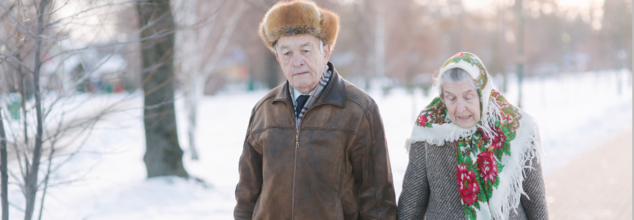
Image Credit: Canva
Winter Safety For Older Adults: Expert Guide To Preventing Hypothermia And Falls In Seniors
Winter, for one, poses different challenges. Risks for the elderly to slip, hypothermia, or cold injuries can be much greater. Their older bodies don't retain heat that well and some conditions, for example poor balance or slow response, might render winter dangers to be a real challenge. And with a bit of precautions and planning, winters can become tolerable for elders.
As we age, the body's ability to regulate temperature diminishes. Hypothermia, a condition where body temperature drops dangerously low, can develop quickly in cold environments. Dr. P. Venkata Krishnan, Senior Consultant in Internal Medicine, explains, "Older adults are more vulnerable to hypothermia due to changes in body composition and reduced circulation. Staying warm is not just about comfort—it's about survival."
The symptoms of hypothermia include shivering, confusion, slurred speech, and extreme fatigue. If not treated, it can lead to severe health complications, including heart problems, organ failure, or even death.
How to Prevent Hypothermia in Older Adults?
Preventing hypothermia starts with proper preparation:
Dress Appropriately: Layer up with lightweight, loose-fitting, warm clothing. Don't forget essentials like hats, scarves, gloves, and insulated coats.
Stay Dry: Wet clothes can rapidly cool the body, so change out of damp attire immediately.
Keep Warm Indoors: Maintain your home’s temperature between 65 and 72°F. Use space heaters safely, ensuring proper ventilation to prevent carbon monoxide poisoning.
Nourish Your Body: Warm meals and drinks can generate body heat. Avoid caffeine and alcohol as they dehydrate and impair the body’s temperature regulation.
Limit Outdoor Exposure: If going outside, limit the time spent and go out when it is warmer.
Reducing Winter Slip Risks in Seniors
Falls are a leading cause of injury among older adults, and icy conditions significantly amplify this risk. According to the National Institute on Aging, over one in four adults aged 65 and above fall each year, making fall prevention a priority.
Ways To Prevent Falls During Winters
- Clear Pathways: Remove snow and ice from walkways and driveways immediately. Ice melt or sand can be applied for traction.
- Proper Footwear: Wear boots with non-slip soles and sufficient tread for gripping icy surfaces. Avoid shoes or high heels with smooth soles.
- Brighter Light: Use brighter bulbs indoors and place motion-sensor lights near doorways for easy visibility.
- Support Mobility: Attach ice grips to canes or walkers for improved stability on slippery surfaces. Install sturdy and secure handrails on stairs and in bathrooms.
- Strengthen Your Body: Consult a physical therapist to do exercises that enhance balance and coordination.
Dr. Krishnan says, "Simple modifications like installing handrails, wearing non-slip shoes, and using assistive devices can dramatically reduce fall risks."
Driving Safely in Winter
For seniors who drive, icy roads and poor visibility increase the likelihood of accidents. Here are essential tips to ensure safe winter driving:
- Carry an emergency kit in the car with blankets, a shovel, food, and a flashlight.
- Stick to well-plowed roads and avoid driving during storms or on icy bridges.
- Maintain your vehicle with winter-ready tires, windshield wipers, and antifreeze.
- Drive slowly and defensively, particularly in bad weather. Stay Warm Indoors
Winter does not stop at the door. A poorly heated house or unsafe heating practices can be hazardous indoors, too. The NIA states that 20% of all cold-related injuries happen at home.
- Check Heating Systems: Make sure your home heating system is working efficiently. Service heaters regularly and keep vents clear.
- Space Heaters: Place space heaters on flat, heat-resistant surfaces at least three feet away from anything flammable including curtains or furniture. Turn it off when leaving the room. .
- Insulate Your Home: Use weather-stripping on doors and windows to keep out cold air.
- Watch Indoor Temperatures: Use a thermometer to check that your house is between 65 and 72°F.
How to Prepare for Emergencies?
Winter emergencies, such as power outages or severe storms, can become life-threatening to seniors. So, preparation is paramount.
- Build a supply kit with non-perishable food, water, medications, and a battery-powered radio.
- Plan for an alternative source of warmth in the event of power outages. Blankets, space heaters, or other options may be required.
- Keep an eye on elderly neighbors and relatives to know that they are prepared.
Why Winter Safety Is Critical
The body reacts to cold weather differently, especially when one ages. The reward system of the brain, which seeks warmth and comfort, is not as effective. This makes elderly people less able to realize that cold can be dangerous. Scientific studies have revealed that long periods of exposure to low temperatures are associated with increased health risks such as heart strain and respiratory issues.
Winter safety for seniors is not an individual responsibility; it is a community responsibility. Families, caregivers, and neighbors can be quite helpful by calling regularly, assisting with errands, or merely clearing pathways of snow and ice.
Winter is also a beautiful season that also requires respect and preparation, especially for older adults. With awareness and some proactive measures, hypothermia and falls can be prevented. Dr. Krishnan says, "A little preparation goes a long way in ensuring seniors enjoy the winter months safely and comfortably.
Dr P Venkata Krishnan is a Senior Consultant, Internal Medicine at Artemis Hospitals in India
© 2024 Bennett, Coleman & Company Limited

